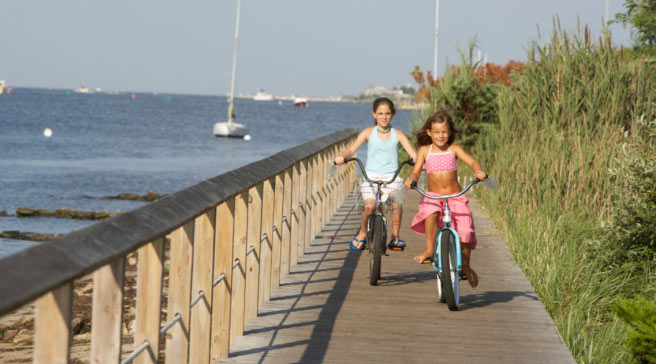Do our children need more freedom?
As the ‘spare the rod, spoil the child’ philosophy grows ever more popular with the parenting experts, are we in danger of dampening our children’s curiosity and need to challenge authority?

Tough love is making a revival with TV parenting experts, from ‘Supernanny’ Jo Frost to Little Angels’ Dr Tanya Byron, urging us to stop trying to be our children’s friends, and start behaving like their parents again.
In a new wave of ‘naughty steps’ and ASBOs, we seem to be turning our back on laissez-faire liberal parenting and embracing a more traditional approach to authority and discipline. Indeed, it’s hard to ignore the message from TV shows and tabloids; today’s children are out of control. But are kids today so different from how we were? And if so, have we made them that way?
With their curriculum-regimented school days, homework and weekends packed with ‘improving’ activities, are we denying them the free weekends and summers of our youth – when we were free to explore and experiment? By ensuring our children are deferential to authority are we stunting their individuality?
There’s a growing unease that, in the new regimen of rules and discipline, children are losing the freedom they need to express their personalities and learn for themselves what is right and wrong. How can we expect our children to become tomorrow’s bright young things if we don’t allow them the space today to grow and learn?
‘Parents should set boundaries’
The author: Sue Cowley
Children do actually want boundaries. They feel a lot safer when they have them. They want you to say, ‘you must not do that’. They like the feeling of control. The sense of living in a little world where they know what is safe, what is right and what is wrong; a consistent world that’s not too complicated. If everything is permissible it can be overwhelming. It’s also unsafe. Children don’t come into this world knowing what is right for them. And parents don’t do their children any favours by letting them get away with things. For the first few years you are training your children – outlining behaviours and setting them structures.
Encouraging discipline doesn’t mean stifling a child’s free will. Children need to be able to have opinions and to express their individuality. I tell parents and teachers we can encourage this by giving them simple choices from a very early age. ‘This drink or that?’ ‘These shorts or those?’ It’s a limited freedom that lets them explore their free will. Later, you will attach consequences to these choices – if you make the wrong choice, then there is a price to be paid. If you choose to throw your food on the floor you don’t get your pudding. The choice is still theirs, but the consequence informs their behaviour. After all, this is what they will encounter out in the real world. Rules, responsibility and consequences.
Sue Cowley is author of Getting Your Little Darlings To Behave (Continuum Inernational Publishing Group), and trains teachers and parents in managing children’s behaviour.
‘Children need more freedom’
The philosopher: Stephen Law
Over the past 20 years there has been an anti-liberal backlash, which blames everything that’s wrong – from teenage pregnancy to the rise in crime – on the 1960s and the liberal rejection of authority. This kind of rigid, nannying, authoritarian thinking is on the rise, particularly in the US. There’s a sense that we have been far too liberal. The feeling seems to be that if we are to save Western society, we need to reinstate the traditional parenting and religious schools that tended to dominate in the 1960s.
I published a book earlier this year arguing against this, and in favour of freedom of thought. Not freedom of action, but freedom of expression. No school, regime or authority should be encouraging children to unquestioningly accept. You repeatedly hear myths, for example that the kind of education where you encourage children to think and question just invites anarchy and indiscipline in the classroom. There is no case for it. In fact, there is far more evidence to suggest that it is not a terribly healthy thing for a society to actively encourage people to be deferential to authority. I believe that reason has a vital role to play in education and a healthy dollop of critical thought should be included in any child’s moral upbringing. But that suggestion can upset people. They are not happy about encouraging young people to think and criticise their fundamental moral and religious convictions. It’s even more important in today’s society that we make sure young people are raised to think and question.
Stephen Law is Lecturer in philosophy at the University of London and author of The War for Children’s Minds (Routledge).









